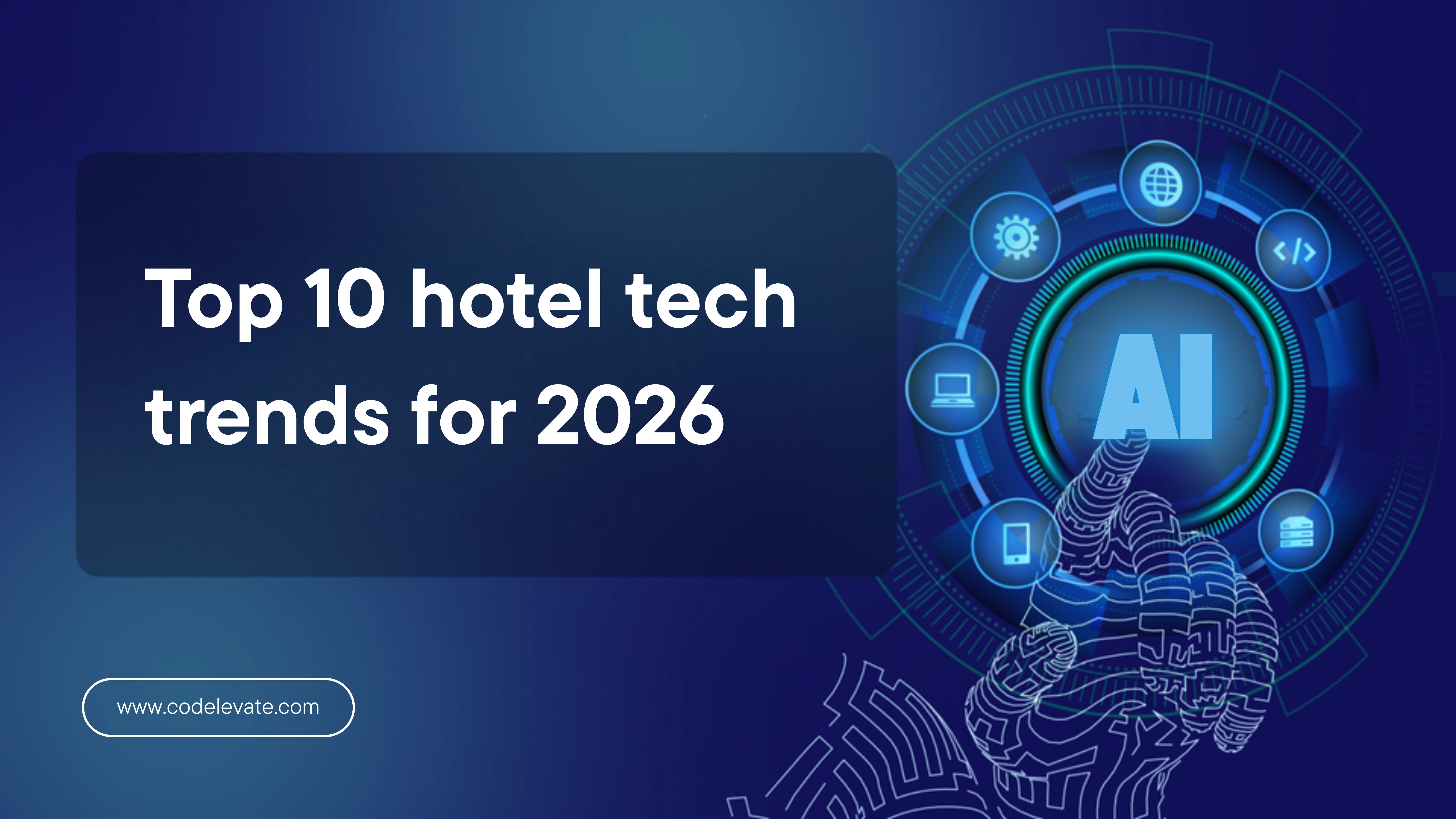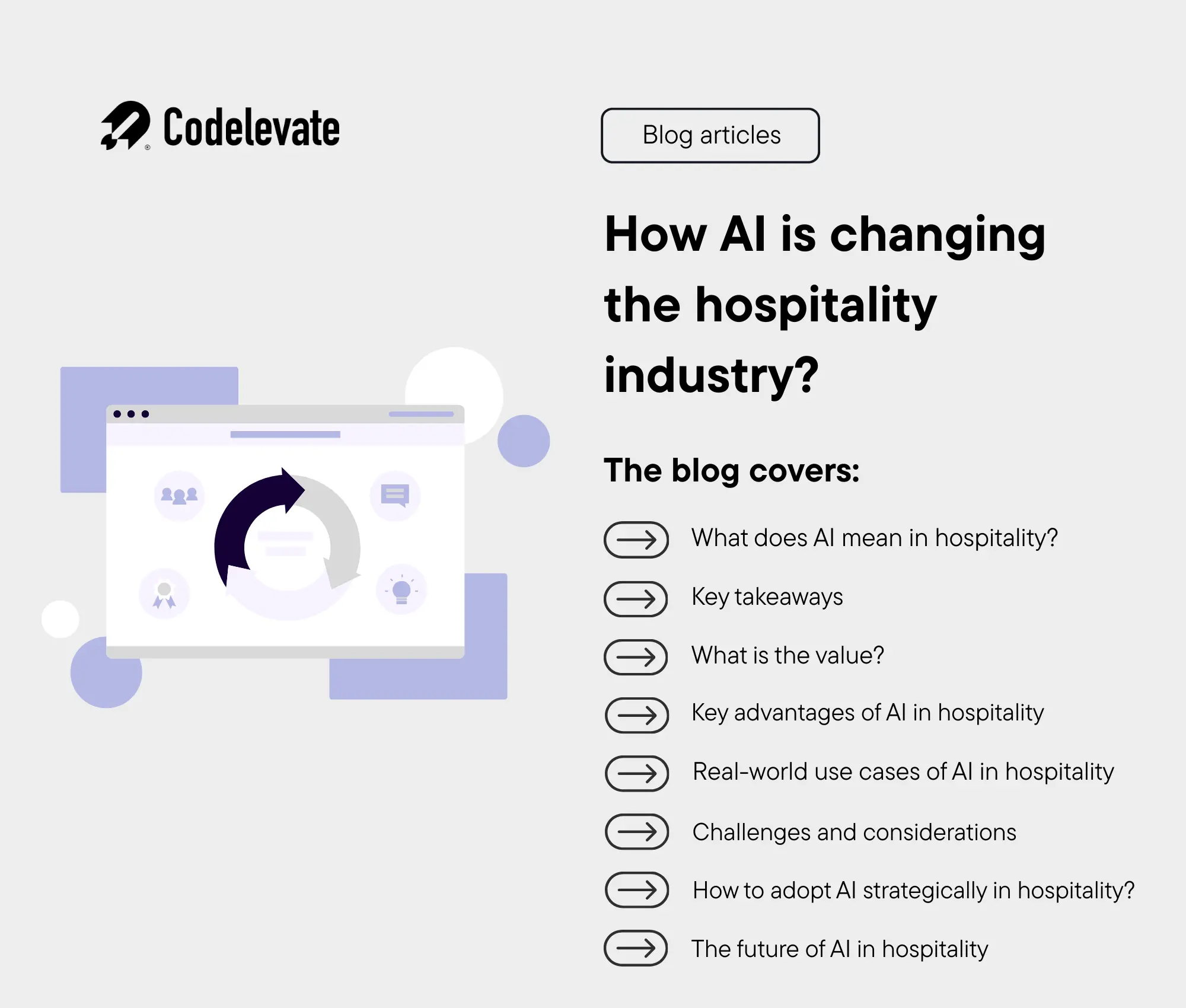Top 10 hotel tech trends for 2026

When you walk into a hotel in 2026, you may no longer recognise the lobby, the front desk or even the guest room. That’s because hotel technology has shifted from nice-to-have to absolutely essential. The internet was once a big deal, then smartphones, apps, social media. Now we’re in the era of AI, IoT, personalisation and sustainability - and hotels that embrace these changes will stand out.
If you’re a hotel owner, manager or just someone curious about hospitality, this article walks you through the top ten technology trends for 2026. Let's dive right in!
1. Voice tech and chatbots
Guests don’t want to wait. They expect to ask a question and get an answer instantly — much like when they ask Alexa or Siri at home. Hotels are now turning to chatbots and voice technology to handle basic guest queries, booking changes, service requests and more. According to a recent article, the hospitality sector is already moving into “AI and automation” in a big way.
Why it matters: It means your staff can focus on real guest moments, rather than answering “What time is breakfast?” for the thousandth time. It improves speed, frees up front desk agents, and adds consistency.
What to keep in mind:
- Your hotel website and FAQ must be accurate — the chatbot or voice assistant can only be as good as the data behind it.
- Integrate with your PMS or booking system so the guest identity and stay details can be referenced.
- Train your chatbot for “what ifs” — lost items, medical needs, late check-in. In the words of an industry article, “chatbots can provide … more effective” service than a recorded message.
A few tools you might look at: Many service providers offer hotel-specific chatbots. For example, you can explore solutions via platforms like HospitalityTech.
2. Facial recognition check-in
Imagine a guest arriving at your hotel, glancing at a camera in the lobby, and walking straight to their room without ever stopping at the front desk. This is biometric check-in or facial recognition entering the hotel space. According to a trend listing for 2026, this is already a key item.
Why it matters: It speeds up arrival, reduces crowding in reception, improves security and enhances the “wow” factor of your property.
What to keep in mind:
- Privacy regulators differ by country, so you’ll need consent and transparent notices.
- Biometric equipment and integration with key-cards or mobile keys need coordination.
- While it sounds futuristic, it’s not widely deployed yet in all hotels — this means an opportunity to be ahead.
- Tip: You could pair facial recognition with mobile-key apps and kiosks so guests have options.
3. Smart room technology
In 2026, hotel rooms are becoming mini smart-homes. Guests want to use their phone or voice to control lighting, temperature, blinds, entertainment, and even order services from the room. Multiple sources point to “smart rooms” or IoT technology as a major shift.
Why it matters: It raises guest satisfaction (they feel in control and comfortable) and it can help with energy savings (lights off when room is empty, HVAC optimised).
What to keep in mind:
- Choose devices that are easy to use for all age groups.
- Integrate with your central system so housekeeping, maintenance and guest services have visibility.
- Keep security in mind — all these connected devices are potential cyber-points of entry.
4. Digital check-in, smart energy and real-time analytics
Many hotel companies are now tracking data in real time — guest behaviour, occupancy, service requests, energy usage — and using it to make quick decisions. As noted in a 2026 trend article: over 63% of hotels already have mobile keys / kiosks, 51% use smart energy systems, 47% apply real-time analytics.
Why it matters: You reduce bottlenecks (check-in/out), improve guest flow, lower costs (energy-usage) and respond faster to guest needs.
What to keep in mind:
- Real-time analytics only work if data is captured well and systems talk to each other (front desk, housekeeping, maintenance).
- Smart energy systems take investment, but with rising utility costs and guest expectation for sustainability they’re worth it.
- Mobile check-in apps need to be reliable, simple for guests, and supported by your staff.
5. Cloud-based property management systems (PMS)
Your PMS is becoming the nerve centre of your hotel. Cloud-based platforms allow front desk, housekeeping, management and even sales to connect in real time, from multiple devices, across locations. A recent article for 2026 calls this “PMS-driven transformation” of hospitality operations.
Why it matters: It brings agility, allows remote work or management, enables guest-profile integration with revenue tools, upselling, and better data for decision-making.
What to keep in mind:
- When switching to cloud, plan for data migration, staff training, connectivity reliability.
- Ensure that the PMS integrates with other systems: revenue management, channel manager, guest engagement platforms.
- Consider security and backup — cloud doesn’t mean unprotected.
6. Predictive maintenance tools
Rather than fixing things after they break (a boiler fails, an AC unit stops), hotels in 2026 will increasingly monitor equipment proactively, detect faults early via sensors/AI and plan maintenance before disruption. This is forecast as a major efficiency lift.
Why it matters: Guests hate disruptions — no AC, no hot water, noisy pipes. Predictive maintenance keeps things smooth, reduces emergency repair costs, improves longevity of equipment.
What to keep in mind:
- You’ll need sensors or digital tracking of equipment health.
- Maintenance workflow must adapt — preventative, rather than reactive.
- Data from equipment should feed into your analytics so you can schedule & budget ahead.
7. Wellness tech integration
Guests increasingly expect wellness as part of their stay — not just a gym or spa, but smart rooms designed for sleep optimisation, air purification, circadian lighting, app integration and services such as mindfulness or nutrition. One 2026-focus article highlights this trend.
Why it matters: Wellness is no longer luxury only — for many travellers it’s priority. If your rooms and services reflect that, you can gain differentiate and premium pricing.
What to keep in mind:
- You don’t need every “cool gadget” — focus on what your guests care about (e.g., quiet room, good air, lighting).
- Align wellness tech with your brand and guest profile. Business travellers may care about sleep, families about air quality.
- Train staff to explain and promote wellness tech, otherwise guests may not use it.
8. Mobile food & beverage ordering
In-room dining, lobby bar, poolside service — all increasingly ordered and delivered via guest’s mobile phone. Hotels are using mobile ordering to improve speed, upsell items, reduce friction at service points. According to trend listings for 2026 this is high on the agenda.
Why it matters: It reduces wait times, improves guest convenience, drives additional spend (upsells, specials) and frees staff to focus on delivery rather than taking orders.
What to keep in mind:
- Mobile order app must be seamless, menu updated, delivery schedules clear.
- Consider pairing with service robots or delivery systems for novelty and efficiency (if budget allows).
- Focus on F&B experience quality—technology helps, but food quality remains key.
9. Hyper-personalisation
With more data, smarter tech and closer guest-journey tracking, hotels in 2026 will anticipate guest needs before the guest even asks. This means rooms pre-set based on guest profile (lighting, temperature, entertainment), custom amenities, curated experiences. The trend article for 2026 uses the phrase “anticipate needs before check-in”.
Why it matters: Personalised experiences lead to better reviews, guest loyalty, higher spend and differentiation in a crowded market.
What to keep in mind:
- Data must be captured (guest preferences from past stays, profile, booking source).
- Privacy matters — guests must feel comfortable, trust you with their data.
- Staff must support the personalisation—guest sees the result, not the tech behind it.
10. Sustainable luxury
Sustainability is no longer optional. In 2026, many travellers expect eco-credentials, net-zero carbon goals, recycled materials, solar energy, vertical gardens, plant-based menus, waste reduction. According to a 2025/26 report, more than 80% of large hotel groups have committed to net-zero by 2050.
Why it matters: Millennials and Gen Z are particularly eco-aware. Sustainability adds brand value, operational savings (energy, water), and may become a requirement rather than a differentiator.
What to keep in mind:
- Don’t just “tick the box” — integrate sustainability into the guest experience (e.g., see solar panels, waste-reduction info, local sourcing).
- Track metrics (energy usage, waste, water) and report them.
- Communicate your efforts clearly to guests — many will reward you for transparency.
Bonus: How to choose what to invest in
With ten big tech trends reshaping hospitality, it’s natural to wonder where to start. The truth is, not every innovation will fit your property or budget. The key is to be strategic, not reactive. Here are a few guiding ideas to help you decide what to adopt first and how to make it work for your hotel.
Know your guest profile
Every hotel has a unique audience, and the right tech depends on who walks through your doors. If you cater mainly to families or leisure travelers, wellness technologies like air purification systems, circadian lighting, or in-room entertainment might make a bigger impact. For business travelers, focus on convenience: mobile check-in, high-speed connectivity, self-service kiosks, and real-time analytics that help streamline operations. Boutique or luxury properties might prioritize personalization features, while resorts could see the biggest returns from sustainability and smart energy systems.
Start small and scale
You don’t need to implement everything at once. Choose one or two technologies that best align with your brand promise and financial plan. Start with a pilot program in one department or a few rooms, collect guest feedback, measure success, and adjust. Once you see clear results — higher guest satisfaction, faster check-ins, reduced costs — scale up gradually. This phased approach helps control expenses, reduces disruption, and gives your staff time to adapt.
Build your tech ecosystem
The most successful hotels in 2026 are those using integrated systems rather than a patchwork of disconnected tools. When your PMS connects seamlessly with guest apps, energy systems, and analytics dashboards, operations become smoother and insights clearer. This “ecosystem approach” prevents duplicated work, reduces data errors, and allows you to personalize services more effectively. A recent 2026 hospitality tech report predicts the industry will continue to move toward “simplification and unification of fragmented tech stacks” — meaning fewer systems doing more, together.
Train your team
Even the smartest technology fails without human buy-in. Your staff should understand not just how to use the tools, but why they matter. Provide hands-on training and show how tech helps them save time, improve guest satisfaction, and make their jobs easier. Empower your team to report issues, suggest improvements, and use technology as a tool, not a burden. Remember, genuine hospitality still comes from people — technology simply enhances their ability to deliver it.
Measure results
Success needs data. Before you invest, set clear performance indicators such as guest satisfaction scores, energy savings, revenue per available room (RevPAR), check-in times, or upsell conversions. Monitor these metrics regularly and share the progress with your team. This creates a culture of accountability and continuous improvement, helping you understand what’s working — and where to adjust your strategy.
Tell your story
Finally, don’t keep your tech upgrades a secret. Guests love to hear that your hotel is forward-thinking, sustainable, and committed to improving their experience. Highlight your innovations in your marketing, social media, and website. Show how your technology improves comfort, safety, or sustainability. When guests see that your tech investments are designed with them in mind, it builds trust and loyalty — and that’s what truly sets your property apart in 2026 and beyond.
In short, invest smartly, integrate intentionally, and never forget that technology should serve your guests - not the other way around.
Conclusion
We are well into a new era for hotels – one where tech is not just something behind the scenes but front-and-centre in how guests live, relax, work and sleep while on property. If you embrace voice and chatbot support, biometric check-in, smart rooms, mobile services, predictive maintenance, wellness integration, hyper-personalisation and sustainability, you’ll be ready for 2026 and beyond. The hotel industry is no longer simply about beds, breakfast and staff behind a desk - it’s about immersive experiences powered by intelligent, guest-focused technology. Your job as a hotelier is to select the right tools, implement thoughtfully, support your team and tell your story. Do that and you’ll not only meet guest expectations, but you’ll exceed them.
If you are curious how AI is changing the hospitality industry and want to stay up to date with the latest trends, check out this guide.

Ready to bring AI-powered solutions to your hospitality business? Partner with Codelevate and book a free strategy call to discuss your project and explore scalable, high-quality software solutions.



.png)
.png)
.png)
.svg)




